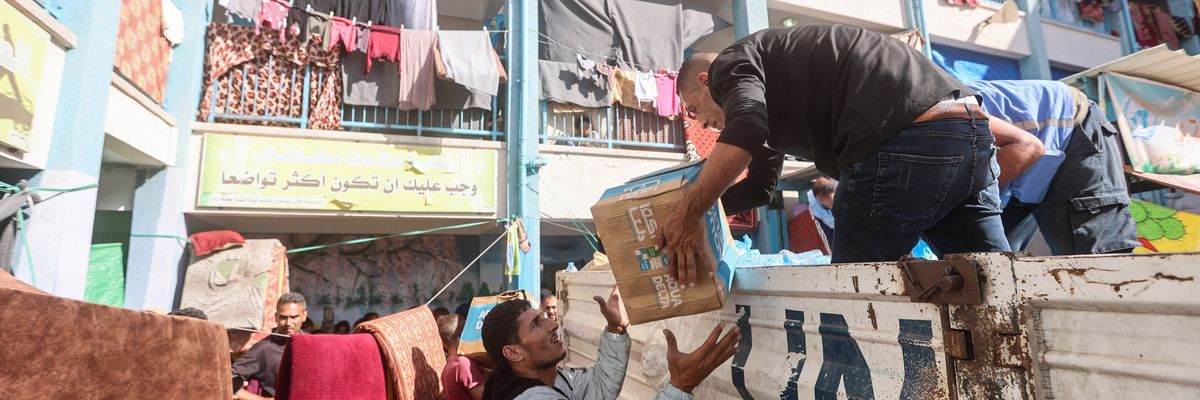Israel will no longer permit the United Nations Relief and Works Agency for Palestine Refugees in the Near East to drive convoys bearing food aid into northern Gaza, even as the area is on the brink of famine.
Israeli officials informed the U.N. of the new restrictions on Sunday, prompting outrage and dire warnings from U.N. officials and other human rights advocates.
"By preventing UNRWA to fulfill its mandate in Gaza, the clock will tick faster toward famine and many more will die of hunger, dehydration, and lack of shelter," UNRWA Commissioner-General Philippe Lazzarini posted on social media. "This cannot happen, it would only stain our collective humanity."
"I have urged Israel to lift all impediments on aid to Gaza. Now this—MORE impediments."
In his response, Lazzarini said that UNRWA was the largest organization operating in Gaza with the greatest capability to distribute aid.
"This is outrageous and makes it intentional to obstruct lifesaving assistance during a man-made famine," Lazzarini said. "These restrictions must be lifted."
The news comes as medical workers and international aid organizations have sounded the alarm about famine in Gaza. At least 23 children in northern Gaza have already died from starvation or dehydration, and one-third of children under two years old suffer from acute malnutrition, according to the United Nations' International Children's Emergency Fund. A new Integrated Food Security Phase Classification report published on March 18 found that famine was "imminent" in Gaza's northern governorates and likely to begin "anytime" between the report's publication and May. In the northern governorates, where around 300,000 live, almost two-thirds of households endured at least 10 days and nights when they did not eat at all in the last 30 days.
"Blocking UNRWA from delivering food is in fact denying starving people the ability to survive," World Health Organization Director-General Tedros Adhanom Ghebreyesus said on social media. "This decision must be urgently reversed. The levels of hunger are acute. All efforts to deliver food should not only be permitted but there should be an immediate acceleration of food deliveries."
U.N. Under-Secretary-General for Humanitarian Affairs and Emergency Relief Coordinator Martin Griffiths also called for Israel's decision to be "revoked."
"I have urged Israel to lift all impediments on aid to Gaza. Now this—MORE impediments," Griffiths posted on social media, calling UNRWA the "beating heart of the humanitarian response in Gaza."
UNRWA Communications Director Juliette Touma toldBBC World on Monday that a quarter of a million people in the north rely on UNRWA food aid, yet the agency has not been able to deliver to them in two months. An attempt on February 5 had to turn back after the Israeli Navy fired on an aid convoy even as it traveled along a pre-approved route.
Touma told BBC World that more than 1 million people in Gaza now live in UNRWA shelters.
"They lost everything, and they need everything," Touma said.
Touma added that the most important commodity people in Gaza need is food, but they also need "safety, and they need protection, above all, and a cease-fire, which is very, very much overdue."
The U.N. Security Council finally succeeded in passing a resolution on Monday calling for an immediate cease-fire in Gaza and the release of all hostages as the U.S. abstained from the vote.
Outside the U.N., former Human Rights Watch executive director Kenneth Roth said on social media that the food aid decision showed Israeli Prime Minister Benjamin Netanyahu's "starvation strategy at work," as well as his "vendetta against Palestinian refugees."
CEO of Medical Aid for Palestinians Melanie Ward also decried Israel's decision to permanently block UNRWA convoys from the north.
"This would be a death sentence for thousands," Ward said on social media. "They cannot be allowed to do this."
